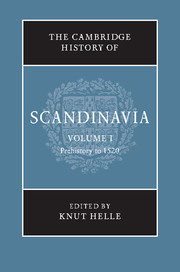Book contents
- Frontmatter
- Introduction
- PART I THE GEOGRAPHY AND PREHISTORY OF SCANDINAVIA
- PART II FROM VIKINGS TO KINGS
- PART III MATERIAL GROWTH (to c. 1350)
- PART IV THE HIGH MEDIEVAL KINGDOMS
- PART V HIGH AND LATE MEDIEVAL CULTURE
- 14 Ideologies and mentalities
- 15 Literature
- 16 Art and architecture
- 17 Music
- PART VI LATE MEDIEVAL SOCIETY (c. 1350–1520)
- PART VII SCANDINAVIAN UNIONS (1319–1520)
- Conclusion
- Select bibliography: primary sources, general surveys and secondary works arranged by part
- Index
- Plate Section"
- References
14 - Ideologies and mentalities
from PART V - HIGH AND LATE MEDIEVAL CULTURE
Published online by Cambridge University Press: 28 March 2008
- Frontmatter
- Introduction
- PART I THE GEOGRAPHY AND PREHISTORY OF SCANDINAVIA
- PART II FROM VIKINGS TO KINGS
- PART III MATERIAL GROWTH (to c. 1350)
- PART IV THE HIGH MEDIEVAL KINGDOMS
- PART V HIGH AND LATE MEDIEVAL CULTURE
- 14 Ideologies and mentalities
- 15 Literature
- 16 Art and architecture
- 17 Music
- PART VI LATE MEDIEVAL SOCIETY (c. 1350–1520)
- PART VII SCANDINAVIAN UNIONS (1319–1520)
- Conclusion
- Select bibliography: primary sources, general surveys and secondary works arranged by part
- Index
- Plate Section"
- References
Summary
The history of mentality deals with a great variety of topics; ultimately, it is a way of regarding history rather than a particular discipline. For this reason, a short survey like the present chapter has to be fairly selective, the more so as this approach to history – with some exceptions – has been introduced fairly recently to Scandinavia and has not resulted in many empirical studies. This treatment of mentality will be linked to the two great organisations that were built up in Scandinavia in the high Middle Ages: the monarchy and the Church. In this way, it will also be possible to treat mentality in close connection with ideology, i.e. to discuss changes in the implicit aspect of thought and behaviour as well as doctrines and constitutional principles.
The old society and the new: a royalist programme of the thirteenth century
A main theme in most surveys of the Scandinavian countries until around 1300 is the growth of the state (cf. Chapter 12). The mental aspect of this development is illustrated particularly clearly in The King’s Mirror, a Norwegian work from the mid-thirteenth century, formed as a dialogue between a father and a son. To its author the king is first and foremost a judge, a picture which accords well with the above-mentioned development of royal justice in Norway at the time. As God’s representative on earth, he should represent an impersonal justice above the parties and judge them according to their merits, taking into account not only the external facts of the case but also its circumstances, the intentions of the criminal, as well as his or her whole personality.
Keywords
- Type
- Chapter
- Information
- The Cambridge History of Scandinavia , pp. 463 - 486Publisher: Cambridge University PressPrint publication year: 2003
References
- 3
- Cited by

